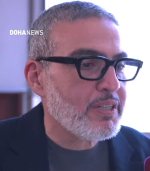
George Windsor, the Earl of St Andrews and a member of the British royal family, has handed over a 16th-century book to Poland's National Library, which originally belonged to its collection
in the 18th century.
The National Library of Poland has endured a turbulent and often tragic history, mirroring the country's own challenges. Established in the mid-18th century, when Poland was one of Europe's largest states, the library held one of the world's largest book collections at the time.
However, much of its collection was seized by the Russians in the 19th century and transferred to St. Petersburg. Although some of the collections were eventually returned to Warsaw after Poland regained its independence in 1918, a significant portion was destroyed by the Germans during World War II.
Describing the return of the book as a historic moment, Tomasz Makowski, the library's director, expressed deep gratitude and emotion towards Earl George Windsor for his donation, emphasizing the significance of the book finding its way back to its home.
The book in question, L'histoire de Primaleon de Grece, was published in 1572 and is a French translation of the chivalric romance Primaleón by Spanish author Francisco Vázquez.
During his visit to Warsaw, the earl revealed that he had stumbled upon the book more than 30 years ago while studying at Cambridge University. At the time, he had an interest in chivalric romances and Renaissance literature, prompting him to purchase the book from a market. It was only years later that he discovered its origin as part of the former collection of Józef Andrzej Załuski, an esteemed 18th-century bishop and bibliophile.
Załuski, along with his brother Andrzej Stanisław, also a bishop, established the library. The donated book bears a stamp inside that reads "ZALVSKI."
Having kept the book on his own bookshelf for many years, the earl expressed his happiness in returning it to its rightful home. He described it as his modest contribution to the restoration of Polish cultural heritage.
The earl noted that the book's binding suggests it had been in Britain since the 19th century. It is known that many books that were taken from Warsaw to St. Petersburg by Russia went missing and ended up in private collections.
During his visit, the earl also mentioned his proficiency in the Polish language, which he had learned many years ago due to his interest in languages, culture, and literature.
The National Library faced significant losses during World War II when the German occupiers set fire to the building following the Warsaw Uprising in 1944. Nearly 800,000 items, including approximately 50,000 manuscripts, 2,500 incunabula, 80,000 early printed books, and 100,000 drawings and engravings, were lost forever. Some items were saved by being evacuated out of the country.
As part of the visit, the library showcased a gospel book with Anglo-Saxon influences published around 1000 A.D. in France. The item was acquired by the Załuskis in the 18th century, taken to St. Petersburg, returned to Poland after 1918, briefly moved to Canada in 1939, and then returned once again to Warsaw. Photo by Witia, Wikimedia commons.









































